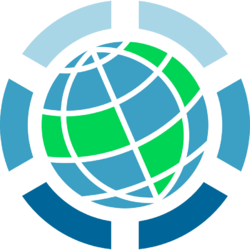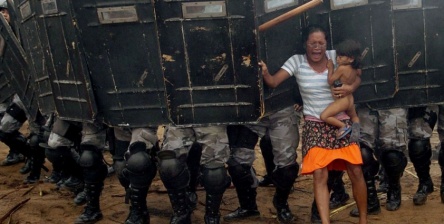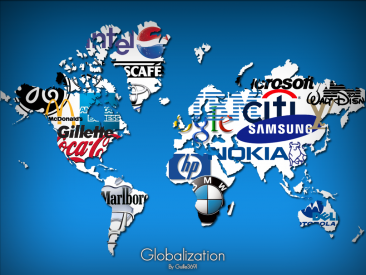Difference between revisions of "Globalisation"
(reword ON/problems section) |
(Supranational Deep State section) |
||
| (11 intermediate revisions by 5 users not shown) | |||
| Line 1: | Line 1: | ||
{{concept | {{concept | ||
| − | |wikipedia= | + | |wikipedia=https://en.wikipedia.org/wiki/Globalisation |
|image=WikiProject_Globalization_Logo.svg | |image=WikiProject_Globalization_Logo.svg | ||
|type=idea | |type=idea | ||
| + | |constitutes=Neoliberalism | ||
|description=A modern coinage to refer to the process of the intermixing of previously different and more distinct societies. The phrase is used as something of a front under which to push a corporate friendly neo-liberal agenda. | |description=A modern coinage to refer to the process of the intermixing of previously different and more distinct societies. The phrase is used as something of a front under which to push a corporate friendly neo-liberal agenda. | ||
}} | }} | ||
| + | '''Globalisation''' or '''Globalism''' are concepts. | ||
| + | |||
==Official narrative== | ==Official narrative== | ||
| − | Wikipedia reports that "globalisation is the process of international integration arising from the interchange of world views, products, ideas, and other aspects of culture", and suggests that is was popularised in the late 1980s and the 1990s. In 2000, the [[International Monetary Fund]] identified four basic aspects of globalization: trade and transactions, capital and investment movements, migration and movement of people, and the dissemination of knowledge. | + | Wikipedia reports that "globalisation is the process of international integration arising from the interchange of world views, products, ideas, and other aspects of culture", and suggests that is was popularised in the late [[1980s]] and the 1990s. In [[2000]], the [[International Monetary Fund]] identified four basic aspects of globalization: trade and transactions, capital and investment movements, migration and movement of people, and the dissemination of knowledge. |
===Problems=== | ===Problems=== | ||
| + | [[Image:manaus-police-eviction.jpg|An indigenous woman holds her child while trying to resist the advance of Amazonas state policemen in Manaus|thumbnail|444px]] | ||
Like "[[terrorism]]", the word "globalisation" has a rather imprecise meaning, though it is often used to refer to "economic globalisation", a rather [[establishment]]-friendly usage; while advances in travel and telecommunication technology have lead quite naturally, perhaps even inevitably, to a greater intermixing of languages, cultures etc. the corporate agenda referred to as "(economic) globalisation" seems far less natural and is certainly not inevitable. The {{ccm}} has applied the label "[[anti-globalisation]]" as a catch all to any groups which promote alternative models of globalisation. <ref>http://www.anti-globalisation.com/anti-globalisation/</ref> | Like "[[terrorism]]", the word "globalisation" has a rather imprecise meaning, though it is often used to refer to "economic globalisation", a rather [[establishment]]-friendly usage; while advances in travel and telecommunication technology have lead quite naturally, perhaps even inevitably, to a greater intermixing of languages, cultures etc. the corporate agenda referred to as "(economic) globalisation" seems far less natural and is certainly not inevitable. The {{ccm}} has applied the label "[[anti-globalisation]]" as a catch all to any groups which promote alternative models of globalisation. <ref>http://www.anti-globalisation.com/anti-globalisation/</ref> | ||
==Economic globalisation== | ==Economic globalisation== | ||
| + | [[image:Economic globalisation.png|right|366px]] | ||
The banner of "economic globalisation" is often used as a means of changing national laws, a so-called process of "[[harmonization]]". In practice, one aspect of a group's laws are often harmonized by choosing the most business friendly of the set of laws available, and standardising on that. Where states have a wide variety of laws and regulations, a set of such harmonizations can result in a large shift in effective laws. | The banner of "economic globalisation" is often used as a means of changing national laws, a so-called process of "[[harmonization]]". In practice, one aspect of a group's laws are often harmonized by choosing the most business friendly of the set of laws available, and standardising on that. Where states have a wide variety of laws and regulations, a set of such harmonizations can result in a large shift in effective laws. | ||
| + | |||
| + | It is the opposite of [[Economic nationalism]]. | ||
==Supranational institutions== | ==Supranational institutions== | ||
| − | Especially since [[NAFTA]] in 1994, so-called "[[free trade]]" agreements (for which citizens' approval is rarely sought), [[nation states]] have been signing away their sovereignty through the creation of supranational institutions and laws, | + | Especially since [[NAFTA]] in [[1994]], so-called "[[free trade]]" agreements (for which citizens' approval is rarely sought), [[nation states]] have been signing away their sovereignty through the creation of supranational institutions and laws, apparently to resolve economic disputes. In practice these laws are often selectively enforced, ie. the USA broke its trade agreements with Mexico by imposing import taxes on wheat and could get away with it because Mexico had no power to enforce its part of the contract. |
| + | |||
| + | The sweeping powers, undemocratic and unaccountable nature of such authorities have evoked widespread concern with some critics suggesting that they are part of a [[globalist]] agenda to render the [[nation state]] obsolete by establishing a [[New World Order]]. These concerns have not been widely reported by the {{ccm}}. | ||
| + | |||
| + | ==Supranational Deep State== | ||
| + | {{FA|SDS}} | ||
| + | The Supranational Deep State (SDS) is the alliance of formerly fairly distinct national deep states which coalesced in the second half of the 20th century. It is not an alliance of senior business or military leaders or politicians, but of the deep politicians that pull their strings. It is not inter-national, but supra-national, that is to say, it has de facto control over most national governments. | ||
{{SMWDocs}} | {{SMWDocs}} | ||
| − | |||
==References== | ==References== | ||
{{reflist}} | {{reflist}} | ||
Latest revision as of 09:46, 9 September 2024
(Neoliberalism) | |
|---|---|
 | |
| Type | idea |
| Interest of | • Nicolas Baverez • Best for Britain • Center for Global Development • Giulietto Chiesa • Frank Furedi • General Agreement on Tariffs and Trade • Globalisation Institute • Mark Hackard • Anthony Hall • Henri Hartung • Ulrik Vestergaard Knudsen • Barr McClellan • Brendan O'Neill • Manfred Petritsch • SDS • Raymond Vernon • Carlo Maria Viganò • WEF • WEF/Young Global Leaders • Ngaire Woods |
| A modern coinage to refer to the process of the intermixing of previously different and more distinct societies. The phrase is used as something of a front under which to push a corporate friendly neo-liberal agenda. | |
Globalisation or Globalism are concepts.
Contents
Official narrative
Wikipedia reports that "globalisation is the process of international integration arising from the interchange of world views, products, ideas, and other aspects of culture", and suggests that is was popularised in the late 1980s and the 1990s. In 2000, the International Monetary Fund identified four basic aspects of globalization: trade and transactions, capital and investment movements, migration and movement of people, and the dissemination of knowledge.
Problems
Like "terrorism", the word "globalisation" has a rather imprecise meaning, though it is often used to refer to "economic globalisation", a rather establishment-friendly usage; while advances in travel and telecommunication technology have lead quite naturally, perhaps even inevitably, to a greater intermixing of languages, cultures etc. the corporate agenda referred to as "(economic) globalisation" seems far less natural and is certainly not inevitable. The commercially-controlled media has applied the label "anti-globalisation" as a catch all to any groups which promote alternative models of globalisation. [1]
Economic globalisation
The banner of "economic globalisation" is often used as a means of changing national laws, a so-called process of "harmonization". In practice, one aspect of a group's laws are often harmonized by choosing the most business friendly of the set of laws available, and standardising on that. Where states have a wide variety of laws and regulations, a set of such harmonizations can result in a large shift in effective laws.
It is the opposite of Economic nationalism.
Supranational institutions
Especially since NAFTA in 1994, so-called "free trade" agreements (for which citizens' approval is rarely sought), nation states have been signing away their sovereignty through the creation of supranational institutions and laws, apparently to resolve economic disputes. In practice these laws are often selectively enforced, ie. the USA broke its trade agreements with Mexico by imposing import taxes on wheat and could get away with it because Mexico had no power to enforce its part of the contract.
The sweeping powers, undemocratic and unaccountable nature of such authorities have evoked widespread concern with some critics suggesting that they are part of a globalist agenda to render the nation state obsolete by establishing a New World Order. These concerns have not been widely reported by the commercially-controlled media.
Supranational Deep State
- Full article: SDS
- Full article: SDS
The Supranational Deep State (SDS) is the alliance of formerly fairly distinct national deep states which coalesced in the second half of the 20th century. It is not an alliance of senior business or military leaders or politicians, but of the deep politicians that pull their strings. It is not inter-national, but supra-national, that is to say, it has de facto control over most national governments.
Examples
| Page name | Description |
|---|---|
| Freeport | |
| Special economic zone | |
| Transnational corporation |
Related Quotations
| Page | Quote | Author | Date |
|---|---|---|---|
| Ziad Abdelnour | “Iran's going to be finished and every single Arab regime that's like this will be finished. Because there is no room for us capitalists and multinationalists in the world to operate with regimes like this. Its all about money. And power. And wealth... and democracy has to be spread around the world. Those who want to espouse globalization are going to make a lot of money, be happy, their families will be happy. And those who aren't going to play this game are going to be crushed, whether they like it or not! This is how we rule. And this is how it's going to be as long as you have people who think like me.” | Ziad Abdelnour | 18 November 2005 |
| Council for Inclusive Capitalism with the Vatican | “The [Council for Inclusive Capitalism with the Vatican] is yet another front group in what is becoming a globalist bum’s rush to try to convince a skeptical world that the same people who created the post-1945 model of IMF-led globalization and giga-corporate entities more powerful than governments, destroying traditional agriculture in favor of toxic agribusiness, dismantling living standards in industrialized countries to flee to cheap labor countries like Mexico or China, will now lead the effort to correct all their abuses? We are being naïve if we swallow this.” | William Engdahl | |
| Malcolm Roberts | “It’s called the largest ever wealth transfer from taxpayers to globalist corporations - in this case Big Pharma. As usual, govt is the middle man & the means of extracting money from taxpayers. Legal yet immoral.” | Malcolm Roberts | 7 August 2021 |
Related Documents
| Title | Type | Publication date | Author(s) | Description |
|---|---|---|---|---|
| Document:Address by Igor Strelkov 11 September 2014 | address | 11 September 2014 | Igor Strelkov | Igor Strelkov breaks his silence: A brutally honest, MUSt-READ address by the former commander of the NAF, about Russia, the civil war and the influence of traitorous elements of the Russian establishment in betraying the Novorussian rebellion |
| Document:Alexander Dugin to the American people on Ukraine | letter | 8 March 2014 | Aleksandr Dugin | A letter to 'The American people' from senior Russian academic and advisor to President Putin, Alexander Dugin about the Spring 2014 situation in Ukraine and Russia-western relations generally. |
| Document:CIA Coordinates Nazis and Jihadists | article | 19 May 2014 | Thierry Meyssan | Global politics used to be a question of Right (Captalist) - v - Left (Socialist) - or so we were expected to believe. Today the dominant question is 'Side with Anglo-US-Nato or oppose it?' - with the full spectrum of Left-Right present in both camps. |
| Document:Emperor Obama's Old-New clothes and the US energy war | article | 2 October 2014 | Vera Graziadei | The Ukraine imbroglio is a 100% US engineered event aimed at isolating Europe from Russia and developing US business interests in alternative energy supplies for both Ukraine and Europe |
| Document:GEAB No 84 Crisis Alert for European governance | article | 15 April 2014 | GEAB team | Surprisingly frank commentary and analysis from a mainstream think-tank about the global Anglo-US agenda with particular reference to unfolding events in Ukraine |
| Document:Igor Strelkov and Russia's Fifth Column | article | 12 September 2014 | 'The Saker' | Extended commentary and analysis of the statement by Igor Strelkov about the West's war on Russia and Russia's 5th Column problem |
| Document:Masters of metal | article | 30 July 2015 | Rusticus | A startling and ominous analysis of progress towards an impending New world Order |
| Document:NATO’s new Cold War runs into trouble in Germany | article | 2 May 2014 | Christoph Germann | Evidence of a substantial and growing disconnect between the German establishment and its population. The official narrative of an agressive expansionist Russia is being comprehensively rejected and it spells trouble for NATO |
| Document:Power and the Global Ruling Class | paper | 4 June 2014 | Bernd Hamm | In depth structural survey global power, who exercises it and how it is organised |
| Document:Reset This! | article | 1 April 2015 | Kevin Annett | A diatribe against "The system" and those who believe mankind has any future in some kind of 'financially reset' version of it. |
| Document:Springtime for Russophobia | article | 6 September 2014 | Mark Hackard | On the roots of the Russo-phobia of Western Establishments and its burgeoning in the wake of Russia's clear red-line over Ukraine |
| Document:The Elite the Great Game and World War III | article | 8 June 2011 | Mujahid Kamran | A global economic system erected on inhuman and predatory values, where a few possess more wealth than the billions of hungry put together, will end, but the end will be painful and bloody |
| Document:The Imperial Empire: The Sun Never Sets but the Mote remains in the Emperor’s Eye | article | 16 May 2016 | James Petras | The structure and vulnerabilities of the US Empire |
| Document:The Next Crisis – Part one | article | 18 September 2014 | David Malone | A global crisis of capitalism and governance began to manifest seriously in 2007-8. It is far from over |
| Document:The Next Crisis – Part three | article | 29 September 2014 | David Malone | The present crisis of financial capitalism and world governance is not over yet - towards a world turned upside-down |
| Document:The Next Crisis – Part two | article | 22 September 2014 | David Malone | The present crisis of financial capitalism and world governance is not over yet - A manifesto for the continued supremacy of the 1% |
| Document:The Threat of War and the Russian Response | article | 23 September 2014 | Sergei Glazyev | An adviser to the Russian President analyses the current systemic global crisis and the way forward for Russia and the world |
| Document:US Openly Approves Hong Kong Chaos it Created | article | 30 September 2014 | 'Tony Cartalucci' | There is more to "Occupy Central" and the September 2014 demonstrations in Hong Kong than western media reports of "popular protests for democracy". The movement is thoroughly compromised by its links to and funding by US State Department and other Western NGO's |
| Document:US is militarizing Ukraine to invade Russia | discussion | 20 June 2014 | Sergei Glazyev | Vladimir Putin's economic adviser outlines the massive militarisation of Ukraine and the Anglo-US agenda that is behind it. |
| Document:Usaia to attack Russia in 2015 | interview transcript | 31 May 2014 | Evgeny Fedorov | A coup d´état under the guise of an ‘Colour Revolution’ is being prepared in Russia. The big picture and the details are given by Evgeny Fedorov, a deputy in the Russian parliament, and coordinator of the People’s Liberation Movement. |
| Document:Why Angela Merkel has lasted so long | Article | 30 July 2021 | Wolfgang Streeck | 2 months before the September 2021 elections in which Angela Merkel will retire as Chancellor, a German economic sociologist writes as to why and how she has been able to hold onto power in Germany for so long after an unprecedented 16 years in power. |
| File:LandGrabsFoodSystem2013.pdf | paper | February 2013 | Sophia Murphy | |
| File:The Network of Global Corporate Control.pdf | paper | 26 October 2011 | Stefania Vitali James B. Glattfelder Stefano Battiston | Network analysis of the structure of global corporate interleaved ownerships and revenues. |
| File:US Money v Corporation Currency.pdf | book | 1912 | Alfred Owen Crozier | Prophetic 1912 book about the evil effects of privatised central banking in general and the activities of the Rothschild dynasty in particular |
| Document:Fourth Meeting of the Libya Contact Group | article | 15 July 2011 | Unknown |

